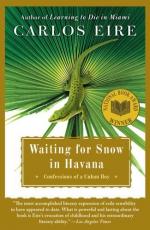|
This section contains 494 words (approx. 2 pages at 400 words per page) |

|
Waiting for Snow in Havana - Confessions of a Cuban Boy Summary & Study Guide Description
Waiting for Snow in Havana - Confessions of a Cuban Boy Summary & Study Guide includes comprehensive information and analysis to help you understand the book. This study guide contains the following sections:
This detailed literature summary also contains Topics for Discussion and a Free Quiz on Waiting for Snow in Havana - Confessions of a Cuban Boy by Carlos Eire.
Waiting for Snow in Havana is a memoir by Carlos Eire. When Eire is 11 years old, he and his brother Tony are sent by themselves to the United States to escape the oppression of Fidel Castro. He is among 14,000 other Cuban children who are exiled without their parents. Children do not need security clearances, so they can get in quickly. For the parents, it takes months or sometimes years. It will be three-and-a-half years before Carlos' mother finally gets to America. His father never will.
The book opens on New Year's Day of the year Eire is 8. Batista has fled that morning, and Castro is in power. For the next few years, Eire will continue to live in Cuba, but nothing is the same after that. The memoir is an account of his life in Cuba for a few years before and after the revolution. It touches briefly on what happens after he gets to the United States, but for the most part, Eire delves into his childhood memories of Cuba; full of lizards, turquoise water, firecrackers, bombs, car-surfing, and tangerine-colored sunsets.
Eire's father is a judge, and they live in the lap of luxury. They live in a museum-like house full of antiques, along with a chauffeur and maids, and Eire attends the same posh Catholic school as Batista's sons. It is not just the wealth that disappears. It is the freedom that quickly diminishes--freedom to watch movies, freedom to have pastries and cola, freedom to speak as one wishes.
Eire's father, a man who is convinced that he is the reincarnated Louis the XVI of France, knew from the beginning that Fidel would mean only trouble for the Cuban people. However, he never takes any action to leave the country when there is still time. Indeed, he never does leave the art collection that he cherishes. Eire does not understand this choice on the part of his father. It seems to him that the judge chose his things over his sons. However, it is also the judge who took Carlos, Tony, and all their friends car-surfing (driving through the surf when the waves were engorged from the storm), to Chinatown to buy firecrackers, and to the Miramar Theater to watch The Vikings over and over again.
Carlos' mother does not share the same sentiment as her husband does about staying. Indeed, it is she who finally makes the decision to leave the country with her two boys. It is she who makes all the arrangements and gets the paperwork in order, and it is she who sends her boys away and joins them over 3 years later. She also does not share the belief that she was Marie Antoinette in her past life.
The book is full of the sense of loss and longing for a life long-gone and a future promised but revoked. It speaks of the life that might have been, and the life he found instead.
Read more from the Study Guide
|
This section contains 494 words (approx. 2 pages at 400 words per page) |

|



